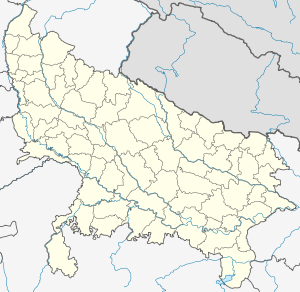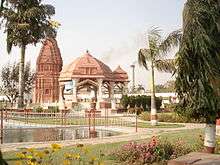Gola Gokarannath
| Gola Gokarannath | |
|---|---|
| city | |
| Nickname(s): Choti Kashi | |
 Gola Gokarannath Location in Uttar Pradesh, India | |
| Coordinates: 28°05′N 80°28′E / 28.08°N 80.47°ECoordinates: 28°05′N 80°28′E / 28.08°N 80.47°E | |
| Country |
|
| State | Uttar Pradesh |
| District | Lakhimpur Kheri |
| Area | |
| • Total | 6 km2 (2 sq mi) |
| Elevation | 147 m (482 ft) |
| Population (2001) | |
| • Total | 53,832 |
| • Density | 8,972/km2 (23,240/sq mi) |
| Languages | |
| • Official | Hindi |
| Time zone | IST (UTC+5:30) |
| PIN | 262802 |
| Telephone code | 05876 |
| Vehicle registration | UP 31 |
Gola Gokarannath or Gola Gokaran Nath is a city, a municipal board,and tehsil in Lakhimpur Kheri district in the Indian state of Uttar Pradesh. Gola Gokran Nath is famous for its Shiva Temple and BHL sugar Mill. Gola Gokaran Nath is also called 'Chotti Kashi' ('Little Kashi').
Demographics
As of 2011 India census,[1] Gola Gokarannath had a population of 60,172. Males constitute 53% of the population and females 47%. Gola Gokarannath has an average literacy rate of 68%, higher than the national average of 59.5%: male literacy is 73%, and female literacy is 62%. In Gola Gokarannath, 14% of the population is under 6 years of age.
History
During the famous war of Ramayana in Treta Yug Ravana pleased Lord Shiva with his penance so that he could win the war against Lord Rama. Lord Shiva took the shape of a Shiv-ling and directed him to install that Shiva-ling in Lanka. But Lord Shiva put the condition that Shiv-Ling should not be put on the Earth on its way to Lanka. But on the way back, Ravana had to give the Shiva-ling to a shepherd to attend nature's call. Shiva increased the weight of the Shiva-ling so the shephard had to give up and put the ling on the ground. This made Ravana very angry as he understood the trickery of Lord Shiva. Ravana understood that Lord Shiva did not want the Ling to be carried to Lanka and let Ravana win the war. Enraged Ravana pressed the Ling with his thumb resulting in an impression which looked like a cow's ear (गौ-कर्ण). It is on this basis that the place was named Gola Gokaran Nath.
Attractions

Gola is famous for its Shiva Temple. Many people come here from distant places for darshan. It is difficult to find space in the temple during Hindu holy month of Shravan. Other places of religious significance are Lakshmi-Narayan temple in BHL Sugar factory and Bhoot Nath temple near Degree College. There are many colleges and schools. There are many markets like Tirath colony, Tiwari Market at Mill Road Punjabi colony,purvi dixitana,kumharan tola,paschimi dixitana,arjun nagar colony,bharat bhushan colony,virendra nagar colony,munnuganj,unchi bhood,nichi bhood,etc. Tirath Bazaar is primarily a ladies shopping place for bangles, makeup/cosmetics items, Holy books, pooja things etc. BHL Sugar factory (which is one of the biggest in India) is also worth a visit. gola
Geography
Gola Gokran Nath is situated at 28.08° N 80.47° E. Gola Gokran Nath is a small town situated at the banks of Sarayan river. It is surrounded by dense tropical forest. It is second biggest town of Lakhimpur Kheri district.
Industry
Gola is home to one of the biggest Sugar Mills in Asia. Bajaj Hindusthan Limited is situated in the northern part.
The site selected for the first plant was at Gola Gokarannath in district Lakhimpur Kheri in the Terai region of Uttar Pradesh (UP), an area rich in sugar cane.[2][3][4][5] The original capacity of the factory was 400 tons of cane crushed per day (TCD). Subsequently, this capacity was increased in stages and is currently 13,000 TCD. The distillery Unit at this plant commenced production during the end of World War II in 1944. In the initial few years, the major output was in the form of power alcohol as an additive to petrol, which was then in short supply. The unit was the first to supply alcohol-mixed petrol to the army.
Another sugar plant with a cane crushing capacity of 1400 TCD was set up in 1972 at Palia Kalan, a large cane supplying centre at a distance of about 70 kilometres from Gola Gokarannath.[2]
Temples
There is a Shri Lakshmi Narayan Mandir situated at bajaj hindusthan limited campus,Shree Sai Mandir In Tirth Near Railway Station gola, Ram Madir Near Saraswati Vidya Mandir,Lakhimpur road, Ram Janki Mandir,Mangala Devi Mandir, Khutaar Road, Phool Baba Ashram, Khutar Road,and Jind Baba-Majaar near Bhavani Ganj, Hanumaaan Mandir-Lakhimpur Road, Durga Mandir-Railway Phatak Aliganj Road.
Education
There are many schools and colleges in Gola Gokran Nath. Public Inter College & Krishak Samaj Inter College are the oldest colleges of the city.
Ram Janki Vidya Mandir was the famous inter college upto back few years in private sector, Now Saraswati Vidya Niketan, St. John's College, Saraswati Vidya Mandir, Krishak Samaj Inter College, Lal Bahadur Shashtri Inter College, Gandhi Vidyalaya, Rajendra Giri Memorial Academy, Children's Academy, Guru Nanak Girls Inter College, Global Inter College, Brightland academy, Mother Mary School. Other colleges include Maya Memorial Saraswati Sikhsha Mandir Inter College, J.K.Public Inter college, Gola Public Inter College, Navaodya Vidyalaya are situated here.

Higher education is offered at Cane Grower's Nehru Post Graduate College in Gola, Guru Nanak degree College and Guru Harkishan Degree College. Though science is taught only in Guru Harkishan Degree College.
How to reach
RAJ: This town lies on meter gauge. You can reach from Lucknow or from Bareilly.
Road: Gola Gokaran Nath is about 170 km from Lucknow and can be reached via Sitapur and Lakhimpur. This town in 150 km from Bareilly and can be reached via Faridpur, Shahjahanpur and Mohammadi.
Bus: Regular buses ply between Lucknow and Gola Gokaran Nath. There are some buses from Bareilly as well.now many buses are plying between shahjahanpur & golagokarannath from roadways BUS STAND.
Plane: Delhi to Lucknow and then via bus or train.
References
- ↑ "Census of India 2001: Data from the 2011 Census, including cities, villages and towns (Provisional)". Census Commission of India. Archived from the original on 2004-06-16. Retrieved 2008-11-01.
- 1 2 "Bajaj Hindustan Sugar Mills - Company History".
- ↑ "Milestones - Bajaj Hindusthan".
- ↑ "Bajaj Hindusthan".
- ↑ "The Economic Times".